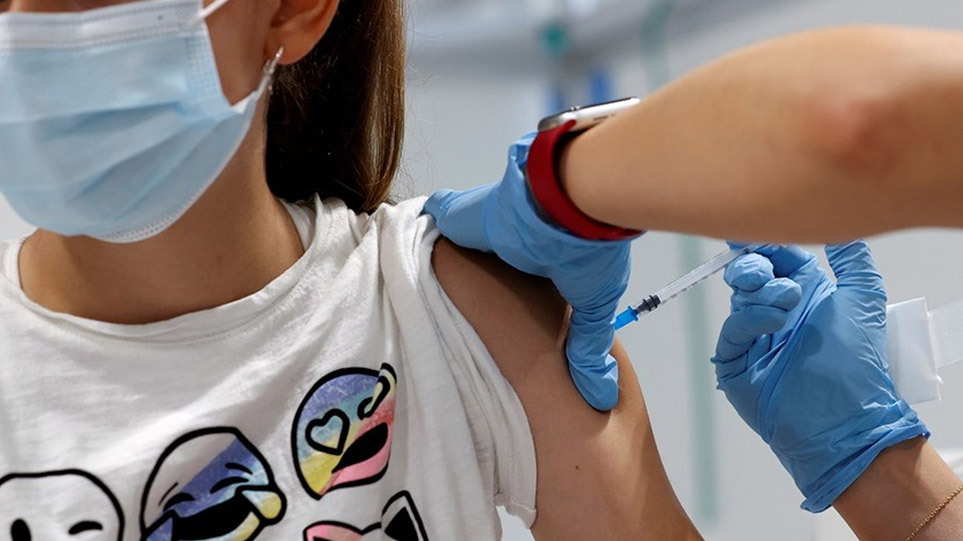
Professor of Health Policy at LSE Elias Mosialos wrote on the approval of the coronavirus vaccine for children and specifically for the ages of 5 to 11 years, the , by posting an extended message on his personal Facebook account.
Prof. Mosialos refers to the clinical trials that were carried out until the licensing of vaccines for children aged 5 to 11 years.
“So the first COVID vaccine approved is the Pfizer / BioNTech vaccine based on the results of a randomized controlled trial that evaluated safety and immune responses. (A separate Moderna clinical trial is being considered separately.)
The Pfizer / BioNTech clinical trial initially compared three doses: 30 micrograms (the adult dose), 20 micrograms and 10 micrograms. This first part of the test showed that the 10-microgram dose, the smallest dose corresponding to one-third of the adult dose, had the fewest side effects. At the same time, the vaccine continued to produce strong immune responses at higher doses. In the next part of the trial, more than 2,200 children aged 5 to 11 were randomly assigned to receive either a 10 microgram dose of the vaccine (two-thirds of the participants) or a placebo (one-third of the participants). They all did two doses three weeks apart. “The children who received the vaccine had similar immune responses as the young people aged 16 to 25 who had received 2 doses of 30 micrograms”, says Elias Mosialos
And he goes on to analyze the data:
When Pfizer submitted the data to the FDA for approval, there were not many cases of symptomatic COVID-19 infections in test participants, and estimates showed that the vaccine was as effective as 90 percent. The tests also confirmed that the infections were caused by the Delta variant, which is widely present in our country. So these are the data on which the licensing bodies based the decision to approve the use of the vaccine for children.
But many parents are still worried. But what are the issues that concern parents and are reluctant to vaccinate their children?
I think it is mainly, the side effects they hear that can happen if their children are vaccinated.
But what do we know about the side effects after the vaccine, in children of this age?
Most of the children in the clinical trial had no side effects other than some pain at the injection site. Some experienced fatigue, headaches and / or muscle aches after the second dose (but not after the first dose). Also only 6 percent of children had a fever after the second dose of the vaccine and there were no cases of severe allergic reaction to the vaccine.
But perhaps the fear of some is not there but in the possibility of an unexpected inflammation.
To see this issue as well.
Some very rare cases of myocarditis, which is an inflammation of the heart, have been reported. This was observed mainly in young people after the second dose of mRNA vaccine (Pfizer / BioNTech or Moderna). But most cases were mild and experts reassure parents that children will not have long-term problems.
But here let’s say something else. Among children aged 5 to 11 years who received the Pfizer vaccine during the clinical trial, there were no cases of myocarditis. And also to remember that the health authorities closely monitor this age group for any occurrence of this very rare side effect.
Let me remind you that children aged 5-11 years will receive a reduced dose of 10 micrograms and not 30 micrograms like children aged 12-17 years.
The director of the US Centers for Disease Control and Prevention, Dr. Walensky, said (in an interview with ABC News) that the CDC has not identified reports and concerns about transient heart disease (known as myocarditis) in its nearly 5 million children. vaccinated age group.
The data confirm that the vaccines are safe for young children as well. (https://abcnews.go.com/…/cdc-director-rochelle…/story…)
But let’s stay here and talk about a more important point: the comparison of the vaccine to coronavirus disease. Choosing a parent is not just about vaccinating their child or not. The choice is between a very effective vaccine or the risk of the child getting sick.
Some parents will say ‘my child will not get sick because we are careful, we avoid crowding and we test often’.
But how do they know that?
Children have great social interactions and sooner or later most will catch covid. Especially if the omicron variant prevails, which seems to be very contagious, this will happen sooner than expected with the release of the delta. And they may not even get the news because of the possible asymptote. But this does not mean that a child will not have any problems. Problems with long-term COVID have also been reported in some asymptomatic patients.
So can a parent make the decision not to vaccinate their child?
Of course, it is unlikely that a child will get stuck in the long run, unless he and his parents are completely isolated. That is, if he is deprived of any social contact in order not to receive a safe vaccine.
But before we begin the aphorism about whether a family can isolate a child to ensure that he or she does not get sick, let’s see what parents need to know before making a decision.
I will mention some data from official bodies, first of all about myocarditis (https://www.myocarditisfoundation.org/covid-19…/).
So while myocarditis is very uncommon in children, it has been observed to occur more often in those who have become seriously ill with COVID-19. Consider a study published by the CDC on reports from more than 900 US hospitals (MMWR 2021; 70: 1128-32). 86 children under the age of 16 (between March 2020 and January 2021) were diagnosed with myocarditis among almost 65,000 (0.133%) children with COVID-19. But over the same time period, out of 4 million children who did not catch COVID-19, only 132 developed myocarditis. What does this mean; This is a risk of developing myocarditis that is more than 30 times higher in pediatric patients with COVID-19. And to say here that the study concerns unvaccinated COVID-19 patients.
It was also found that patients with COVID-19 under the age of 16 had a risk of myocarditis similar to that of patients over the age of 75, which was much higher than all other age groups. In addition, the difference in risk for myocarditis was increased in men and the incidence skyrocketed with each wave of the pandemic.
The study researchers therefore reported that the diagnosis of myocarditis in patients under 16 years of age may represent cases of multisystem inflammatory syndrome in children (MIS-C). This syndrome usually occurs 2-4 weeks after coronavirus infection and is manifested by fever, rash, swollen lymph nodes and conjunctivitis. Cardiovascular complications are seen in some patients but it is estimated that most children who develop MIS-C will recover without chronic heart disease. But some may suffer from chronic diseases.
So the impact of heart infection and the much higher risk of myocarditis among patients with COVID-19 compared to patients without COVID-19 underscores the importance of preventing the spread of the virus.
Unfortunately, also according to the CDC, in America, unvaccinated adolescents, according to hospital admissions records, are treated for COVID-19 much more often than their vaccinated peers and emergency visits and hospital admissions for COVID -19 are the highest in states with low vaccine coverage (https://www.cdc.gov/mmwr/volumes/70/wr/mm7036e1.htm…, https://www.cdc.gov/mmwr/volumes/70 /wr/mm7036e2.htm).
But there are still many points to mention.
Let’s say, the good part. Like how many millions of children around the world have been vaccinated against coronavirus and have had no problems (https://www.euronews.com/…/covid-vaccine-for-children…).
For example, in the United States nationally, it is estimated that 16.7% of children aged 5-11 years had received at least one dose of COVID-19 vaccine by December 5, 2021. This represents nearly 4.8 million of the approximately 28 millions of children in this age group.
Many parents who ask me questions about their children tell me that they are reluctant because their doctors are reluctant to recommend them. Medical associations must therefore intensify the information of their members and parents.
I will close by saying that the job of public health experts is to analyze the dynamics of the pandemic and to explain to the decision makers in a transparent manner the risks, but at the same time presenting objectively and the benefit.
The message should be clear and reflect the current situation. So given the emergence of new variants such as the more contagious micron, uncertainties will vary. In this case I referred to the vaccination of children. Here the people in charge decision-making is the parents.
I understand that many are worried and I would like to emphasize my firm position. We are not here to fool anyone. Instead we want everyone to understand the benefits of vaccination.
And as I have said many times, speaking of understanding citizens’ doubts and hesitations: it is not enough to list vaccine options, their availability, or to announce the functionality of the vaccination platform. It just does not work for everyone. This requires consistency and patience and constant information.
People who are hesitant are well-meaning and fearful. So they in turn will understand that the implementation of measures and instructions requires good will and empathy from all of us.
Latest News

WTTC: Travel & Tourism to Create 4.5M New Jobs in EU by 2035
This year, international visitor spending is set to reach 573 billion euros, up by more than 11% year-on-year

IMF: US Tariffs Shake Global Economy, Outlook Downbeat
IMF slashes global growth forecast to 2.8% as U.S. tariffs create uncertainty and ‘negative supply shock

First Step Towards New Audiovisual Industry Hub in Drama
The project is set to contribute to the further development of Greece’s film industry and establish Drama as an audiovisual hub in the region

Airbnb Greece – Initial CoS Ruling Deems Tax Circular Unlawful
The case reached the Council of State following annulment applications filed by the Panhellenic Federation of Property Owners (POMIDA)

Mitsotakis Unveils €1 Billion Plan for Housing, Pensioners, Public investments
Greek Prime Minister Kyriakos Mitsotakis has announced a new set of economic support measures, worth 1 billion euros, aiming to provide financial relief to citizens.

Alter Ego Ventures Invests in Pioneering Gaming Company ‘Couch Heroes’
Alter Ego Ventures' participation in the share capital of Couch Heroes marks yet another investment by the Alter Ego Media Group in innovative companies with a focus on technology.

Corruption Still Plagues Greece’s Driving Tests
While traffic accidents continue to claim lives on Greek roads daily, irregularities and under-the-table dealings in the training and testing of new drivers remain disturbingly widespread

Pope Francis Died of Stroke and Heart Failure Vatican Confirms
As news of the official cause of death spread, tributes poured in from across the globe. The 1.4 billion-member Catholic Church is united in grief, remembering a pope who championed inclusion, justice, and compassion

Increase in Both Museum Visits, Revenues for 2024
As expected, the Acropolis was the top archeological site in the country, followed by Sounion, Mycenae, the ancient theater of Epidaurus, and Vergina in northern Greece

Where Greece’s Tourists Come From: A Look at 2025’s Top Visitor Markets
The United Kingdom continues to hold the top spot as the largest source of incoming tourism, with 5.6 million seats booked for Greece this summer — up 2.2% from last year. This accounts for 20% of all international air traffic to Greece
















![Ξενοδοχεία: Μεγάλο το ενδιαφέρον για επενδύσεις στην Ελλάδα – Η θέση της Αθήνας [γραφήματα]](https://www.ot.gr/wp-content/uploads/2025/03/Athens-hotels-90x90.jpg)
























 Αριθμός Πιστοποίησης
Αριθμός Πιστοποίησης